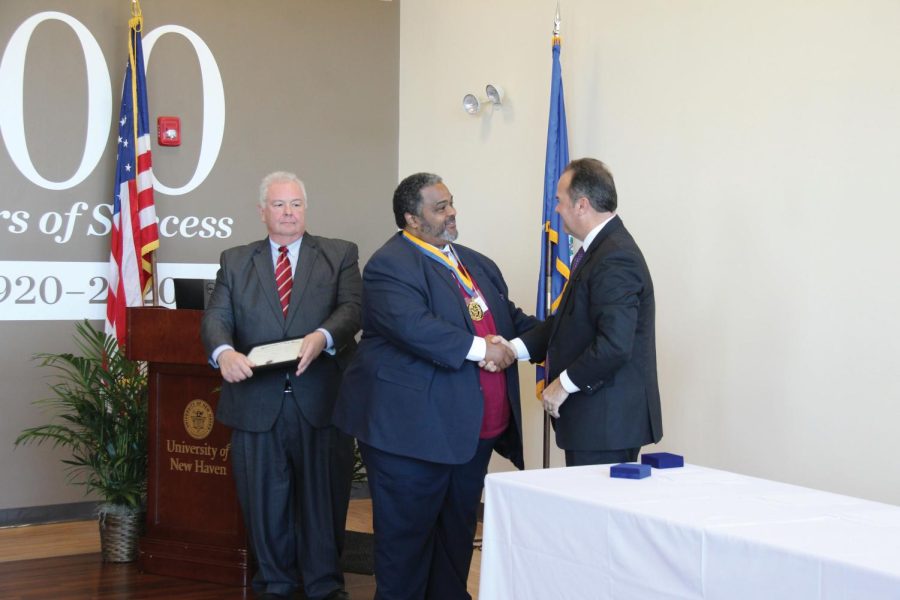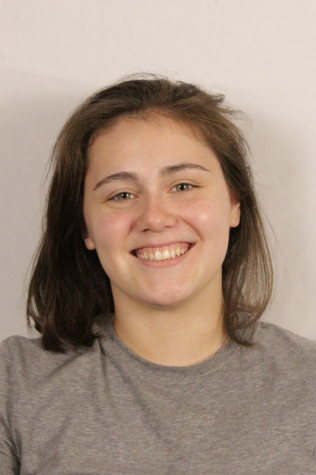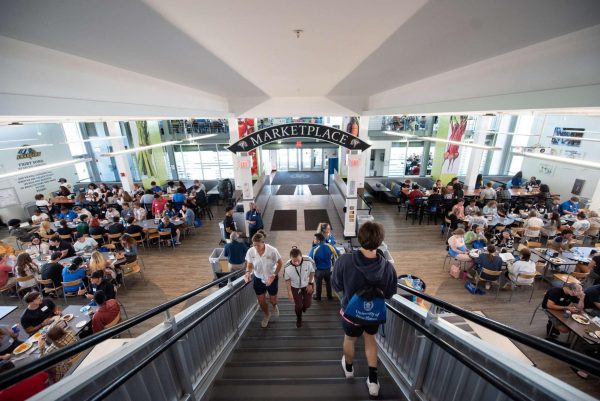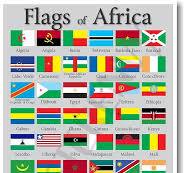University announces named chair and professorship recipients; recognizes faculty achievements
Photo courtesy of Charger Bulletin/Mia Adduci.
Gaboury (left) watches as Boyd (center) shakes hands with Zenger (right), West Haven, Nov. 9, 2022.
A handful of heavily-credentialed university professors were honored for their nationally-recognized work on Wednesday, when the appointees of named chairs and professorships were announced.
The event started with welcoming remarks from Interim President Sheahon Zenger, who took time to recognize the importance of professors within the university, and the fact that the named professorships and chair positions that are being recognized are positions that, according to Zenger, “are incredibly valuable in attracting top talent to the University as well as retaining our very best faculty.”
“The impact our faculty members have in helping to shape our students’ futures and enabling them to discover and pursue their passions cannot be overstated,” said Zenger before handing over the podium to Nancy Savage, interim provost and vice president for academic affairs.
Savage echoed the importance of university faculty in the day-to-day operations.
“Our professors are frequently sought after for their expertise, and they are extensively cited in the media regionally, nationally and internationally,” she said. “Their impact extends far beyond the classroom, and they are dedicated educators and gifted scholars.”
Savage and Zenger also thanked donors who fund named chairs and professorships.
The first presentation was the Jacob F. Buckman Endowed Chair and the Jacob F. Buckman Professorship in chemistry and chemical engineering. Both positions were established in 1981, and the selection of the recipient is determined by a selection committee, which this year included a panel of five professors.
The selection committee unanimously renewed Dequan Xiao as Buckman chair. This will be the second three-year term for Xiao, who is an associate professor and department chair of chemistry and chemical and biomedical engineering.
Savage listed Xiao’s achievements, including his academic work, work as an author, a university research scholar, his influence in launching the chemistry master’s program and his founding of the university’s laboratory for integrative materials discovery, which has since received external grant support.
For the Buckman endowed professorship, the selection committee renewed Chong Qiu for his second term as Buckman professor. Qiu made history in 2019 when he became the university’s first National Science Foundation (NSF) Faculty Early Career Development Program (CAREER) award winner.
According to Savage, Qiu “is using the NSF funding to advance his research on aerosols in the environment that has the potential to shape understanding of the impact of air quality on climate change, weather forecasting and human health.” Some of the grant funding will also be used to support Qiu’s work in creating a regional summer academy for high school students as well as the development of a K-12 STEM pipeline meant to incorporate local students into his research.
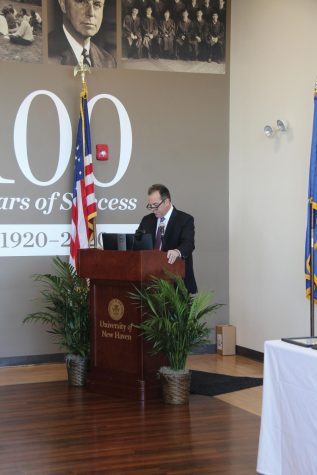
This first professorship to be presented within the Pompea College of Business was the Flanagan Professorship of Business Analytics, one of three recently created named professorships. The Flanagan professorship was established by Lawrence and Stephanie Flanagan in 2022, the former a member of the Board of Governors.
Gazi Murat Duman is the first holder of this professorship. Duman only joined the university in August 2021, but in that time has served as an assistant professor of business analytics and been elected as chair of the economics and business analytics department. In addition, according to Savage, Duman has been instrumental in coordinating “the recruitment and enrollment of 525 MS business analytics students this fall. In less than three years, MS Business Analytics is now the largest graduate program at the University of New Haven.”
Duman has also been lauded for his scholarship, and Savage said that Duman “has eight high-quality peer-reviewed publications and 16 academic papers in conference proceeding.” Conference proceedings are an opportunity for academics to present their research and receive feedback from their peers.
The second endowment within business was the John R. Gehring Endowed Professorship in Business. This professorship was created last year, and the first recipient is Ceyda Mumcu, an associate professor of sport management who has applied her expertise in fan behavior, marketing analytics and diversity marketing in sport, working with the marketing of women’s sports and the media representation of female athletes to educate business students in the field.
Sport has been near and dear to Mumcu, who played professional basketball as a part of the Turkish Women’s Basketball League for eight years prior to her academic career. Since then, as Savage said, “Dr. Mumcu published one of the first sport analytics textbooks, which has been sold in more than 30 countries and across every continent.”
Mumcu has also been a recipient of the Mary Ann Yodelis Smith Award for Feminist Scholarship and Mass Communication’s Commission on the Status of Women for a proposal made by an interdisciplinary research group of which Mumcu is a member. Mumcu also received the Lough Award for her commitment to research and teaching that has been focused on diversity, equity and inclusion in sport marketing, presented by the Sport Marketing Association.
The last professorship to be presented for College of Business was the Smerd Family Professorship in Innovation and Entrepreneurship, established this year and meant to recognize an exceptional educator in relevant studies. The first recipient of this professorship is Vasiliki Kosmidou, who joined the university in 2018 as an assistant professor of management.
Kosmidou is the faculty advisor of the Entrepreneurship Club, which she helped students create. The club’s signature event is the Smerd Pitch Competition, where students can earn a total of $10,000 in seed funding between first and second place winners for the business endeavors they pitched.
Kosmidou has published in “highly-ranked peer-reviewed journals,” said Savage, and has been the recipient of the Pompea College of Business’ teaching excellence award and is a regular speaker at entrepreneur conferences on topics such as entrepreneurial education and the successful launching of new ventures.
The final two endowments of the ceremony were the Dr. Henry C. Lee Chair in Forensic Science and the Stewart Professorship in Criminal Justice and Community Policing. The former was established in 2000 by an anonymous donor and the latter was established in 2021.
The recipient of the established chair in forensic science was Virginia Maxwell, who has served the University of New Haven as assistant chair of the department of forensic science and as the coordinator of the masters in forensic science program. In addition to her work at the University of New Haven, Maxwell holds an honorary senior lecturer position at the University of Connecticut school of law, and has co-taught a law and forensic science class there since 1994.
Maxwell has worked to make changes to traditional animal cruelty investigations by implementing crime scene investigation and forensic science as routine components of the investigations. Maxwell has also developed animal cruelty investigation trainings for animal control officers, relevant first responders and has consulted on multiple cases. Maxwell serves as the scientific advisor for the UCONN Animal Law Clinic as well as the Animal Legal Defense Fund. She has a book due for publication later this year on the subject of animal cruelty crime scene investigation.
Maxwell has rescued nearly a dozen dairy cows, and those cows are now living in new homes and sanctuaries. She has also provided testimony to state legislature on animal cruelty-related issues and is often asked to speak on issues related to factory farming the need for reform in farm animal welfare standards within the U.S.
The final professorship, the Shelley and Ann Stewart Professorship, was awarded to Lorenzo Boyd. Boyd, who worked as a sheriff’s deputy in Boston, has served the university for four years.
“Dr. Boyd is passionate about advancing the true meaning of the word ‘justice,’ which is a mainstay of his classroom teaching and out of classroom work,” said Savage.
In the announcement of Boyd’s appointment, then-president Steven Kaplan said, “In seeking the first holder of the Stewart Professorship, it was clear that our University has a leading scholar of police-community relations with an unmatched national reputation in policing policy.”
Boyd has served the university as department chair, acting dean, assistant provost, vice president and–formerly–director of the University of New Haven center for advanced policing. Beyond the university, Boyd served as advisor to the police chief for eight years in Fayetteville, N.C., is a life member of the National Organization of Black Law Enforcement Executives (NOBLE), has built community policing and community wellness plans for multiple cities and is regularly involved in training police officers across the country in areas such as cultural competence, trauma informed policing and community policing strategies.
Boyd “regularly publishes in the area of police/community relations, and has developed several graduate courses on police/community relations and techniques on policing fragile communities,” said Savage. Boyd co-authored an introduction to policing textbook that will be published next year, and he has co-authored grants of $1.5 million for police training since joining the faculty at the university.
In addition to what Boyd does as a part of the campus community, he currently serves on the Connecticut Police Officer Standards & Training (POST) Council Social Justice Advisory Subcommittee and he serves as chair for the subcommittee for Racism, Bias and Cultural Awareness in police training.



